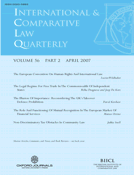First Issue of 2007’s Journal du Droit International
The last issue of the French Journal du Droit International was released a few weeks ago. It contains two articles, written in French, which deal with conflict issues.
The first is authored by Belgian Professor Nicolas Angelet and Belgian Attorney Alexandra Weerts. Its title is “Les immunités des organisations internationales face à l’article 6 de la Convention européenne des droits de l’homme – La jurisprudence strasbourgeoise et sa prise en compte par les juridictions nationales” (International Organisations Immunities and Article 6 of the European Convention on Human Rights – Strasbourg Case Law and How it is Taken into Account by National Courts).
The English abstract reads:
Many authors, as well as a number of domestic court decisions, consider that the jurisdictional immunity of international organisations is compatible with article 6 ECHR upon the condition that an alternative means, or even an alternative remedy before a fair and impartial tribunal within the meaning of article 6, is available to individuals to protect their rights. When this requirement is not met, immunity is sometimes denied in favour of the right of access to court. Yet, in its Waite and Kennedy and Beer and Regan judgements of 18 February 1999 the European Court did not refer to a remedy but rather to a reasonable alternative means, and described it as a material factor but not as a prerequisite for the observance of article 6. The subsequent case law of the European Court confirms this approach and identifies a series of other criteria relevant for the aprpeciation of the proportionality of a restriction imposed on the right to access to court. As for the consequences of a possible conflict, the incompatibility between an international immunity and the right to access to court does not allow to set immunity aside. Rather, domestic courts face a conflict between contradictory international obligations, unsolved by international law. Insofar as the courts cannot require the executive branch to make a political choice of which obligation to comply with to the detriment of the other, litigants may seek to bring the forum State in the proceedings to make it face responsability for the conflict. Above all, domestic courts should seek to prevent the conflict between international obligations, by adopting the balanced approach of the European Court, rather than turning the existence of an alternative remedy into a prerequisite for the observance of article 6.
The second article is authored by Etienne Cornut, who lectures in the French University of New Caledonia. Its title is “Forum shopping et abus du choix du for en droit international privé” (Forum Shopping and Abuse of the Choice of Venue in International Private Law).
The English abstract reads:
In spite of the harmonization of the rules dealing with conflicts of laws and conflicts of jurisdictions, especially at EU level, forum shopping endures, and this convergence of standards is not a remedy by itself, but can only alleviate the problem without eradicating it. The fight against forum shopping malus can only be considered on a case by case basis, but to that end the only exceptions are not sufficient. International private law has developed several instruments to close these loopholes, yet they all focus on the concept of fraud: fraud to the law, fraud to the sentence, fraud to the jurisdiction. In international private law, the sanction by exception of evasion of law arises when the creation or the alteration of an international situation, though objectively actual, does not fit the real intention of the subject, when it is not subjectively actual. Then, when the subject can enjoy the option of international competency, most often he is already in an existing international situation. He has not devised or altered the situation which enables him to exert a choice. Hence, the theory of fraud cannot apply, since it does not make it possible to approach the situations resulting from a pre-existing international situation. Nevertheless, exercising an option of competence, though legal and non fraudulent, can be reprimanded. In that case, the exception of abuse of rights, despite its traditional antinomy with private international private law, should lead to questioning an abusive choice of jurisdiction.
To my knowledge, these articles cannot be downloaded.


 Following swiftly on from
Following swiftly on from  The first issue for 2007 of
The first issue for 2007 of